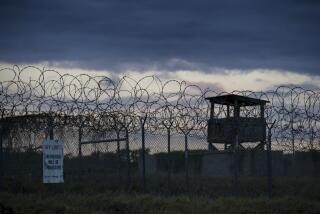U.S. General Sees Al Qaeda Evidence in Iraq
- Share via
BAGHDAD — The capture of an Al Qaeda operative on the Iraq-Iran border is compelling evidence that the terrorist network has begun to take root in Iraq and is joining forces with loyalists from Saddam Hussein’s fallen regime, the commander of the U.S.-led coalition forces said Thursday.
Lt. Gen. Ricardo Sanchez said the arrest this month of Hassan Ghul, described by the United States as a courier for alleged Sept. 11 planner Khalid Shaikh Mohammed, “is pretty strong proof that Al Qaeda is trying to gain a foothold here to continue their murderous campaigns.” “The extent of the infrastructure and the extent of their operations here is still evolving,” Sanchez told reporters at a news briefing.
Sanchez said hints of foreign expertise had been evident since at least mid-November, when a suicide bomber killed 33 people in an attack on an Italian military police base in the southern Iraqi city of Nasiriya.
“For months I’ve been saying that Al Qaeda’s fingerprints have been here in Iraq,” Sanchez said.
The influence was notable, he said, in “the techniques that were being employed by foreign fighters and ... the tactics being employed by suicide bombers.”
The military hasn’t been able to identify any of the suicide bombers who’ve succeeded in blowing themselves up, Sanchez said. But most of the would-be bombers who have been foiled were foreigners, he said.
“We believe that there is some fundamentalist terrorist linkage with the former regime at the tactical level,” he said. “And we believe there are some efforts to strengthen those linkages.”
Sanchez said in November that he hadn’t identified a single Al Qaeda operative in Iraq despite indications that foreign recruits might be playing a part in suicide bombings. Last week he told CNN, “I think it’s probably not appropriate for me to talk about Al Qaeda in the sense of a concrete, proven presence.”
The issue of possible links between Hussein and Al Qaeda has proved controversial for the Bush administration. In September, amid criticism that senior administration officials helped lead Americans to believe that Iraq was behind the Sept. 11 terrorist attacks, President Bush said there was no proof tying Hussein to the plot but added that “there’s no question that Saddam Hussein had Al Qaeda ties.”
Last week, Vice President Dick Cheney said there was “overwhelming evidence” that Hussein had a relationship with Al Qaeda. But earlier in January, Secretary of State Colin L. Powell said he had “not seen smoking-gun, concrete evidence” of such a connection.
Others outside the administration have questioned a possible prewar alliance, pointing out that Hussein’s secular regime would not have appealed to a radical Islamist movement like Al Qaeda.
Few details are known about Ghul or his arrest. Bush said Ghul was in Iraq to facilitate attacks against U.S. troops. American officials have described Ghul as a messenger who reported directly to Mohammed, the Al Qaeda operational commander who was captured in Pakistan in March.
“He was moving money and messages around South Asia and the Middle East,” Bush said last week. “He was part of this network of haters.”
At Thursday’s briefing, Sanchez also cited an unidentified Yemeni man who was arrested after his vehicle failed to explode near a Baghdad police station at the beginning of the Muslim holy month of Ramadan in late October. He has since died in U.S. custody.
Besides an influx of foreign fighters, Sanchez said, U.S. officials have noted that attacks have become more sophisticated and have increasingly targeted Iraqi civilians and civil servants.
On Thursday, explosives inside a cart of diesel fuel were blown up as Iraqi Civil Defense Corps forces passed through the town of Baquba, injuring 11 people, including nine troops.
Hopes that Hussein’s capture would weaken the insurgency have dwindled. The number of U.S. troops killed by hostile fire this month has reached 34, compared with 25 in December.
Three U.S. soldiers remained missing Thursday as rescue crews searched the Tigris River for them, Pentagon spokesman Jim Turner said.
Also Thursday, shopkeepers in the village of Ramadi found threatening leaflets under their doors overnight. Signed by the “Anbar Moujahedeen Brigade,” the pamphlets gave Iraqis who work with Americans 10 days to quit their jobs or “face the consequences.”
Violence is likely to increase until Iraq elects its own government, which would take place this summer at the earliest, said Gen. John Abizaid, chief of the U.S. Central Command.
“But there’s nothing out there militarily that I see that we can’t handle,” he told reporters Thursday in Washington.
*
Times staff writer John Hendren in Washington contributed to this report.
More to Read
Sign up for Essential California
The most important California stories and recommendations in your inbox every morning.
You may occasionally receive promotional content from the Los Angeles Times.













